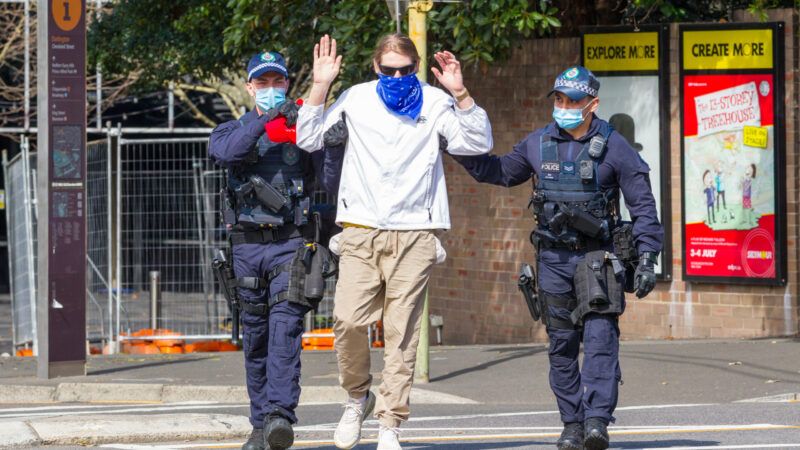The Dangerous Dream of Zero COVID in Australia
The government is ignoring the costs of lockdowns—for lives, for liberty, and for the economy.

We often hear that "if it saves just one life, it must be worth it," no matter the cost. But COVID lockdowns have a considerable cost—not just to the economy, but to liberty and, yes, to lives. Australians have been learning the hard way that the "zero COVID" strategy is impossible. We must learn to live with acceptable risks.
The city of Sydney is in week 12 of a harsh lockdown that has seen residents in the worst-affected areas confined to their homes 23 hours a day, with just 60 minutes permitted outside for exercise. When people do venture out, it must be between 5 a.m. and 9 p.m.
In other parts of Sydney, life is a little easier. People can go out for an early-morning or late-night run, but must stick to a roughly three-mile radius from their home. With the exception of grocery stores, pharmacies, and takeout food and coffee, everything is closed. There have been ripples of protest, but police have promptly shut them down, with organizers facing jail sentences and participants forced to pay millions in fines.
In Melbourne, the government has closed playgrounds and told residents not to watch the sunset. When protestors gathered, police used pepper spray and rubber bullets to disperse them. A child holding a sign saying "let me play" received a face full of pepper spray.
Melbourne was once voted among the world's most livable, desirable cities. Now it's best known for being one of the world's most locked-down cities: More than 225 days and counting of police checking if residents have a reasonable excuse to leave their homes. The federal and state governments have begun to admit the "zero COVID" strategy is unachievable and is limping towards some kind of reopening.
Queensland and Western Australia are both vast states with very low population density. But both have closed their borders to anyone who isn't rich or famous. Rugby and Australian football players can cross the border, but a critically unwell baby, a child separated from his or her parents, or those seeking medical care at the nearest hospital are not so privileged.
South Australia has developed an app which uses geolocation and facial recognition software to enforce quarantine for certain people—a clear infringement on their privacy. But many Australians are just grateful for an alternative to two weeks of solitary confinement in hotel quarantine.
Australia can try to say it did everything possible to stop the spread (except better prioritization of vaccines). The country has surrendered freedom of movement, prohibited people from leaving the country, the state, a three-mile radius, or in many cases their homes. It has only recently begun to count the human cost of these strict lockdowns.
The obsession with lockdowns surely saved some lives from COVID-19, but it also meant that COVID-19 became the only disease it was unacceptable for a life to be lost to. There is a human cost in terms of diseases not treated, medical appointments missed, and symptoms ignored. A "shadow pandemic" of domestic violence has emerged. An average of 40 minors a day in New South Wales are hospitalized due to self-harm and suicide attempts—up 47 percent from 2019. Our suicide hotline has hit multiple all-time records. Many are watching their life savings slowly dwindle. The restaurant where my partner and I had our first date, an establishment which has been a part of the community for 30 years, recently closed its doors forever. These businesses often represent a lifetime of effort lost.
Apparently, none of those costs matter.
The neuroscientist Sam Harris summarized the basics of human well-being in his book, The Moral Landscape: "people tend to be happier if they have good friends, basic control over their lives, and enough money to meet their needs." Yet for nearly two years, Australians have been told to stay home in isolation while their relationships fracture and their livelihoods turn to dust. And they've been told that it's for their own good.


Show Comments (301)